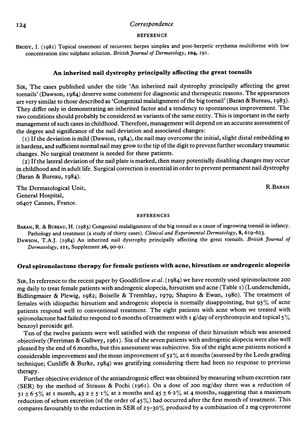An Inherited Nail Dystrophy Principally Affecting the Great Toenails
January 1985
in “
British Journal of Dermatology
”

TLDR The document concludes that an inherited nail condition often improves on its own, and spironolactone effectively treats acne in women.
The document discusses two main topics: an inherited nail dystrophy affecting the great toenails and the use of oral spironolactone therapy for female patients with acne, hirsutism, or androgenic alopecia. The nail dystrophy is compared to 'Congenital malalignment of the big toenail,' with the main difference being the inherited factor and a tendency for spontaneous improvement. The condition's management depends on the severity of the nail deviation, with mild cases not requiring surgery and more severe cases necessitating surgical correction to prevent permanent nail dystrophy. In the second topic, spironolactone was used to treat female patients with androgenic alopecia, hirsutism, and acne. The treatment was particularly effective for acne, with a 52% improvement at 6 months using the Leeds grading technique. Additionally, sebum excretion rate was significantly reduced by 45% after one month of treatment with 200 mg/day of spironolactone, indicating its antiandrogenic effect.





